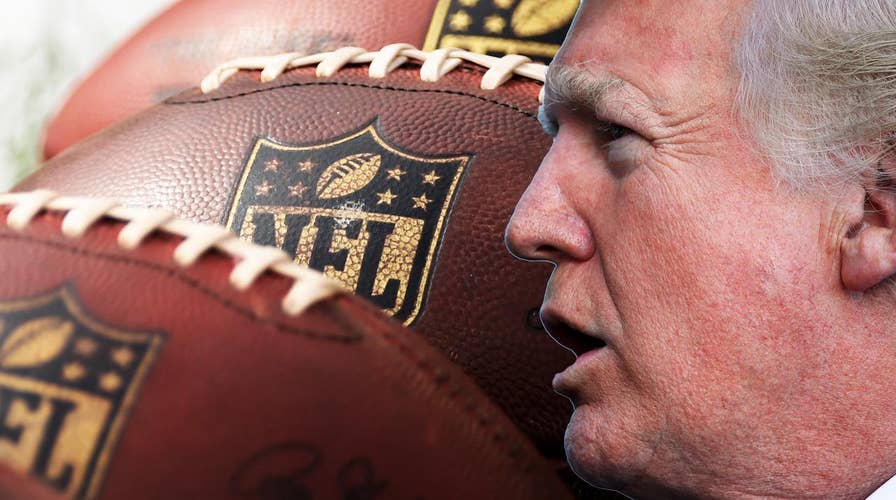Trump threatens NFL, kneeling protesters with tax law
President Donald Trump continues his ongoing feud with the NFL and some of its players’ national anthem protests. Now, the president is taking a new angle and targeting the league's tax status.
This football season it would seem it's President Trump versus the National Football League – and in the latest move, the president warned that he might go after the league’s tax breaks.
“Why is the NFL getting massive tax breaks while at the same time disrespecting our Anthem, Flag and Country? Change tax law!” Trump tweeted on Tuesday.
Here’s a look at the NFL’s current tax status.
Is the NFL tax exempt?
While churches, charities and other nonprofit organizations are usually exempt from certain taxes, the NFL central office is not. It was exempt until 2015, when it voluntarily changed its status.
What about the teams?
While the league office, which handles the administrative side of the game, was exempt until 2015, the NFL teams have always been subjected to taxes.
“The fact is that the business of the NFL has never been tax exempt,” NFL Commissioner Roger Goodell said in an April 2015 memo. “Every dollar of income generated through television rights fees, licensing agreements, sponsorships, ticket sales and other means is earned by the 32 clubs and is taxable.”
The league office was granted its tax exempt status in 1942. The Internal Revenue Service classified the NFL as a trade association, meaning it is exempt from federal income taxes. Exemptions under the 501(c)(6) tax code include business leagues (trade associations), chambers of commerce, real estate boards, boards of trade and professional football leagues.
TRUMP GOES AFTER ESPN HOST, NFL ‘TAX BREAKS’
The inclusion of professional football leagues in the tax code helped the NFL and the American Football League more easily merge in 1966.
So why give it up?
Since the league office’s exemption wasn’t that significant to begin with, it was easy for the NFL to just give it up and benefit from a PR standpoint, Time magazine reported at the time.
Also, Time pointed out, as the league was giving up its tax exemption, it no longer had to reveal how much the boss made -- a win for Goodell.
He made $34 million in 2014, $35 million in 2013 and $44.2 million in 2012.
In his memo, Goodell called the exemption a “distraction.”
TRUMP TWEETS APPRECIATION FOR JERRY JONES AFTER NATIONAL ANTHEM REMARKS
The nonprofit Tax Foundation estimated in 2013 that Congress wouldn’t actually find much additional revenue in taxing the NFL. More specifically, Congress’ Joint Committee on Taxation estimated that it would bring in $109 million over 10 years.
Has anyone else ever threatened its tax status?
Since the national anthem controversy, other Republicans aside from Trump have called for an end to tax breaks the NFL gets at the state level, including subsidies for stadiums.
Last month, Louisiana state Rep. Kenny Havard called for the end of his state's funding to the New Orleans Saints. The Times-Picayune reported that the Saints receive about $165 million of its $1.5 billion value in public funding, incentives and tax breaks.
Before 2015, politicians had pressed for the NFL to ditch its tax exempt status – especially as the league was criticized for its handling of multiple domestic violence incidents.
Sen. Cory Booker, D-N.J., introduced legislation in 2014 that would “increase funding for domestic violence prevention programs by $100 million” by “closing a decades-old tax loophole used by professional sports teams,” his office said then.
Former Sen. Tom Coburn, R-Okla., also attempted to strip the NFL of its tax exempt status in 2013. And former Rep. Jason Chaffetz, R-Utah, said in 2015 that the NFL “should have to pay taxes like everybody else.”






















